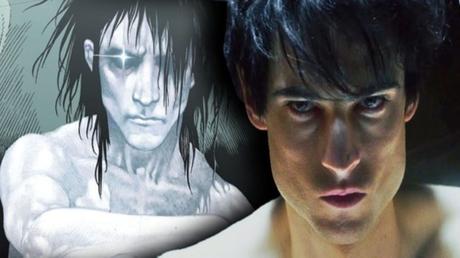
A voice - a man's voice - starts the narration. His tone is solemn, aloof, full of portent, cold. Calculatedly cold. Emotion has all but been drained from his delivery, with the exception of the words "your loves," spoken with barely concealed scorn:
"We begin... in the waking world, which humanity insists on calling the real world... as if your dreams have no effect upon the choices you make. You mortals go about your work, your loves, your wars, as if your waking lives are all that matter."In the next section, an imperceptible change has taken place. The coldness is still present, as is the solemnity. Yet, hints of an obligation arise, a mounting commitment - call it anticipation - about what is to come:
"But there is another life which awaits you when you close your eyes... and enter my realm. For I am the King of Dreams... and Nightmares. When the waking world leaves you wanting and weary, sleep brings you here to find freedom and adventure. To face your fears and fantasies in Dreams and Nightmares that I create... and which I must control, lest they consume and destroy you. That is my purpose and my function." - MorpheusIn a sense, the above passage mirrors (and sounds comparable to) the voiceover alert from the classic 1960s science-fiction anthology, The Outer Limits:
"There is nothing wrong with your television set. We are controlling transmission. You are about to participate in a great adventure. You are about to experience the awe and mystery which reaches from the inner mind to... The Outer Limits."The outer limits, indeed. From the limitations set by one's inner mind, as finite and tangible a substance as that might seem, to the infinite realms of mystery and the unknown, or of the great beyond - truly, wherever they may lead.
Either way, it's the voice that instantly grabs hold of your attention. The voice is in control. The voice tells you what to do, where to go, what to think. Right from the start. Straight on to the end. And it never loosens its grip, never letting up.
In Netflix's The Sandman, adapted from British writer Neil Gaiman's graphic comic-book series from the late eighties to middle-nineties, the voice belongs to Morpheus, the King of Dreams. Not only does the voice make one sit up and take notice, but also the look and the style. And the eyes.
Ah, yes, the eyes! And what eyes! Those twin orbs from which you, the viewer, are accorded a momentary peak into the very depths of the soul itself.
From this premise, more questions will arise: Can one truly see inside a person's soul? Can one perceive the thing that makes an individual tick? That nebulous, indefinable substance that both appeals to and repulses the curious viewer?
This brings to mind that oft-spoken proverb: "Curiosity killed the cat." We mortals are curious by our nature. And curiosity is what fascinates and takes hold of the characters in The Sandman. But here's the most intriguing concept of all: What is it that makes everyone so curious in the first place, and so obsessed with the past?
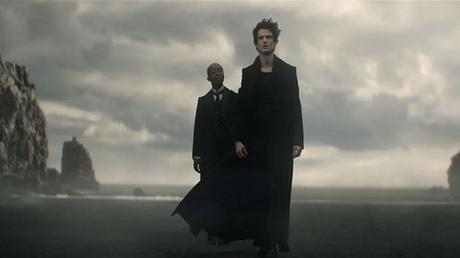
Simply stated, we live a third of our lives in a dream state called "sleep." Psychologically speaking, sleep is nothing more than an outlet for our unconscious and/or subconscious thoughts; an escape valve from reality, such as it is, and a remedy from deprivation.
It's all a fantasy world, to be exact, concocted by ourselves in the act of sleeping; an involuntary making-of tale, if you will. And more often than not, a dream is entirely out of our control. When dreams begin to deteriorate by taking a darker, more terrifying turn, they evolve into nightmares.
In the waking world, we fancy ourselves distinct from what others seem to see. The tendency, then, is for appearances to take precedence over substance. We want others to view ourselves as better or more beautiful and more loving than we fundamentally are.
Of course, it's natural to be liked and admired by those around our person. But if we were to see ourselves as we really ARE, instead of what we pretend to BE... Why, that would destroy the illusion those dreams have so carefully built up, would it not? So, then, what would the end result of this transformation lead to? Our disillusionment? Our descent into chaos, to suffering? To our ultimate destruction and demise?
In turn, this shattering of illusions is what makes The Sandman so fascinating, so watchable, and (dare we say it) so forthright in the extreme. Gaiman's elaboration on ancient Greek myths, to include the Bible, the Bhagavad-Gita, as well as familiar themes from past literary figures such as Jonathan Swift, Lewis Carroll, C.S. Lewis, T.S. Eliot, and many others, along with his friend and contemporary, Alan Moore, have been incapsulated into the Eleven Episodes of Season One. (Hopefully, there will be more.)
While varied, these episodes resist being carbon copies of the books; nor are they facsimiles of Gaiman's writing in general, which featured the wonderfully dark children's fantasy Coraline (2002), among others.
Instead, series' developers Gaiman, David S. Goyer, and Allan Heinberg have retained the essence and scope of the stories, in their keeping to the flavorful and erudite language, but modifying and/or expanding upon it as well, while reassigning the gender/racial facets of some of the protagonists. For the most part, the variations on Gaiman's initial themes tend to hold up well.
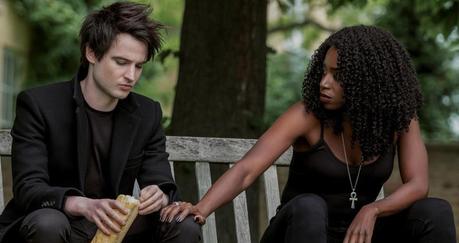
As Morpheus, our titular Sandman (also known by various other titles), London-born actor Tom Sturridge comes off best as a cross between Alan Rickman's Professor Snape and the Heathcliff of Laurence Olivier from Wuthering Heights (1939).
Question: Could Sturridge be the new Tom Hiddleston? Well, there's more than a passing reference to his predecessor's work as the gloomy vampire Adam of Jim Jarmusch's Only Lovers Left Alive (see my review of the film: https://josmarlopes.wordpress.com/2020/06/15/only-lovers-left-alive-2013-a-parable-of-class-consciousness/). But of Hiddleston's enigmatic Loki, there is no comparison.
What is more, it's our opinion that Sturridge, with his imposing height and brooding mien, may have taken a lesson or two from repeat viewings of Johnny Depp in Edward Scissorhands, to say nothing of his "partial" embodiment of Gary Oldman's temperamental Sid Vicious persona (in Alex Cox's biopic, Sid and Nancy) - the quieter aspects, anyway. There are hints as well of Christopher Lee's Count Dracula, but we do digress.
Be that as it may, the Shakespearean spirit is alive and all-but ends well for Sturridge's artfully-acted Morpheus, aka Dream (or "Dreamboat," if you prefer), which survives intact and bears comparison to Olivier's Hamlet. If you don't believe me, revisit Episode 10, "Lost Hearts," where towards the end Morpheus holds a shrunken skull in the palm of his hand. You may hear yourself speaking those immortal words: "Alas, poor Yorick!"
As a none-too-subtle appetizer of sorts, there's the heady "inside joke" of Episode 6, "The Sound of Her Wings." Here, our stand-in for the Common Man, the glib Hob Gadling (Ferdinand Kingsley), meets up with the dark-visaged Morpheus in hundred-year intervals at a tavern patronized by none other than Christopher "Kit" Marlowe ("a very good poet," according to Hob) and a shabby individual Morpheus calls "Will Shaxberd," a playwright of little consequence - that is, until he strikes a Mephistophelean bargain with a devilishly clever Dream. We find this tantalizing bit of name-dropping to be positively enticing.
The mystery of who Morpheus is and what he's about are expressed through voice and visage, through body language and carriage, and (as pointed out earlier) by way of his eyes. In Gaiman's graphic novels, the Sandman's eyeballs sparkle with a star-like gleam in each pupil. His ghostly pallor and post-punk hairstyle provide contrast and high drama, while matching his dour physical attributes to near perfection.

The series' depiction of a televised graphic novel is an oft-recurring feature. Truth be told, this graphic-novel approach not only encompasses the visually focused, comic-book realm to a veritable T but, most luridly, to the adult-world context and vulgar street language inherent therein - think Fritz the Cat meets Taxi Driver.
Not for nothing did Gaiman, a British citizen by birth, come along at nearly the same time as his fellow Brit: Northampton-native Alan Moore and his adult reinterpretations of the superhero ethos in such works as Watchmen and V for Vendetta, both vigilante warriors out for blood; a modern-day monster story in Swamp Thing; the hunt for serial killer Jack the Ripper in From Hell; and the convergence of classic literary figures-turned-detectives in The League of Extraordinary Gentlemen - which, in part, may have influenced the misfit miscreants of Gerard Way and Gabriel Bá's The Umbrella Academy.
By way of affirming whatever virtues these comic-book heroes share or might claim to share, in truth there is little that can be deemed "super" about them. All are flawed, in one way or another, if not downright sick and as mentally disturbed as the villains they pursue.
One extraordinary example occurs in a non-stop segment of Episode 5, entitled "24/7." In what appears to be one long continuous take, buoyed by an absolutely astounding performance by David Thewlis (Professor Lupin of Harry Potter and the Prisoner of Azkaban), the camera follows the psychopathic John Dee as he injects his verbal venom into one broken soul after another; flirting with their innermost feelings, their thoughts, their emotions, and the hidden "truths" behind them all.
Bit by bit, layer by layer, the truth is peaked back and bandied about as if it were the constant drip, drip, drip of a leaky faucet. Perhaps, in this case, a better analogy would be to a broken toilet, where the handle of said toilet prevents the personal "business" of disposing of one's waste product from being flushed down the sewer; what analysts will tell you is the detritus of our innermost wants and desires.
A masterful sequence to be sure ( Spoiler Alert ahead!), one that, while difficult to watch, has been stretched almost to the breaking point of resistance; or maybe it did break and we, the viewers, are only made aware of it at the conclusion: a pile of dead corpses and mangled bodies - lost, broken souls, unable to "handle the truth," to quote a line from A Few Good Men, of who they were and what they symbolized.
In other episodes, one of our favorite villains, the sinister Corinthian (what a name!) leaves an indelible "mark," in a manner of speaking, as he wanders purposely into the real world, committing acts of unspeakable violence against his unsuspecting victims.
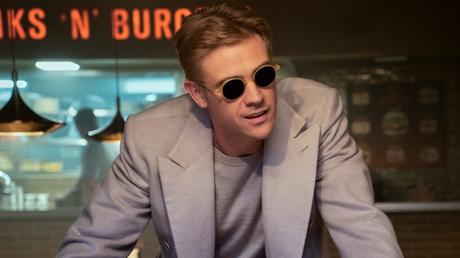
It's up to Morpheus, as stated at the series' outset, to capture him and the other escaped denizens of the dream world; to bring them back to where they naturally belong. He must also search for the three lost sigils of his power: his pouch of dream sand, his helm (which resembles a World War I gas mask with whalebone extension), and his dreamstone ruby.
The Corinthian is an offshoot, certainly not one of the Endless, that cluster of seven metaphysical beings in anthropomorphic disguise representing different states of being: Destiny, Death, Desire, Despair, Delirium, Destruction, and Dream (known as Morpheus - in Greek mythology, the god of sleep).
Played by Kentucky-born actor Boyd Holbrook with an insinuating air and faux Southern charm, the slimy Corinthian deftly maneuvers his way about, in the real world, in laidback languor. He dresses in superbly tailored men's wear. Why, this fellow reeks of class, but it's all surface noise.
And, no, the Corinthian does not dress in leather outfits, but he does sport little, tiny teeth where his eyes should be (shudders!). The better to eat you with, my dears? Talk about a wolf in grandma's clothing, this bad guy is a nightmare come true, but not before Christmas, thank you. He's more in league with A Nightmare on Elm Street 's Freddy Krueger, an avaricious, incorrigible fiend.
A smoothie in all but his name, in Episode 9, "Collectors," the Corinthian is the guest of honor at a Cereal Convention. Yes, you read that right. No, not the Kellogg's of Battle Creek brand - far from it! This rogues' gathering of the faithful ( More Spoilers Ahead!) happens to be a front for vicious serial killers who hide behind a façade of respectability. But the horror of their get-together climaxes in (are you ready for it?) an unanticipated ritual slaughter of a curious gate crasher - more fool him!
As punishment, Morpheus condemns the serial killers to acknowledge their crimes: either by turning themselves in to the authorities or by taking their own lives. This sequence gives new meaning to the term "Dance with Death."
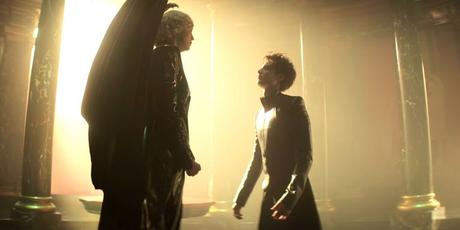
Another delight of the series, one that took many decades to bring forth, lies with Episode 4, "A Hope in Hell," where a remarkable clash of the titans - more a battle of wits than of warriors - takes place; a cascade of dueling verbiage between the mighty Lucifer Morningstar (Gwendoline Christie) and our Morpheus.
They toss their "bons mots" (tongue planted firmly in cheek) at each other with ferocious yet understated bite and determination, poetically speaking. The series' writers and developers worked miracles in this department, so unlike those myriad Marvel and/or Avengers onscreen bouts - endless, protracted, mindless destruction, "full of sound and fury, signifying..." Well, you know the rest. Or you should know!
As mentioned before, Shakespeare's poetic presence is felt everywhere and nowhere at once. Some knowledge aforethought of the Bard of Stratford-upon-Avon would be a prerequisite for viewing this series. That would greatly enhance one's enjoyment without seeming to feel like a homework assignment for English Lit 101.
It might also assist with scrutinizing Morpheus' motives with respect to his handling of humans, and the dearth of common decency he harbors in relating to them, which bespeaks of his inability at understanding their motives.
Sturridge gets the post-punk demeanor down pat. His coif, his high-riser slacks, his black boots, matching dark overcoat, and pasty-faced skin tone complement the Sandman's otherworldly aspects. By virtue of his lofty position as the King of Dreams, Morpheus is a true creature of the night. And the night is where we live out our dreams. Daydreams are for drifters; but night dreams... "Ay, there's the rub!"
It's still the look, the sound (did we not mention the excellent music score by composer David Buckley?), and that eerie stare that stands out from the rest.
Ah, but that voice! That voice...! To quote the duplicitous Senator Palpatine, before the climax of Star Wars, Episode I: The Phantom Menace, "We will watch your career with great interest."
Copyright © 2022 by Josmar F. Lopes
